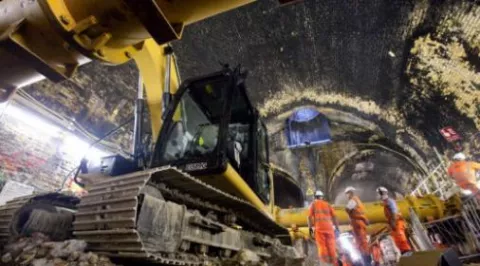
Q&A with Walker Kimball, President of Infrastructure
Walker Kimball has always wanted to build things ‒ and today he helps to build some of the largest infrastructure projects in the world. San Francisco-based Bechtel is a world leader in engineering, construction and project management. Its diverse portfolio encompasses energy, transportation, communications, mining, oil and gas, and government services.
With a father in the construction business, Walker was around builders and engineers from his earliest days. "I never wanted to do anything else," he admits. "I continued on that path straight through school and university." He worked for several other infrastructure companies as a young man before joining Bechtel in his mid-30s, where he's been ever since. Today he lives and works in London, serving as President of Infrastructure and overseeing all of Bechtel's infrastructure efforts including marketing and business development, design, construction and project management.
As early as 2009, Walker saw the trend that today we call the smart city. "We must think of infrastructure in its largest sense," he said in keynote remarks to a business forum. "It is not just roads and bridges. Our infrastructure includes the production and distribution of energy, refineries, all types of transportation, water and wastewater, dams and levees, communications, emergency response capability, hospitals, schools, and parks and recreation."
"Our planning horizon for infrastructure investment must be more than five years," he continued. "It should be for the next 50 years." That's a great attitude for an executive who is helping cities build a foundation for a better future. During our talk, I was especially intrigued to learn about:
- The smart cities line of business that Bechtel – a Smart Cities Council Lead Partner – launched 2013
- The stakeholder approach that can overcome financing hurdles
- The importance of "smart inhabitants"
- The importance of the "building block" approach to smart city projects
‒ Jesse Berst, October 2013
Has the smart cities market hit the tipping point?
I am completely confident it will go mainstream. It lines up with global political sentiment and it lines up with the younger generation of citizens who are now assuming positions of power.
How fast will the market grow?
I see nothing that will stop it or lessen its exponential growth. Just look at the basic concepts at its core ‒ making things more efficient, reducing waste, saving on critical resources reducing carbon emissions.
Do we have the technology we need?
In data collection and processing, we now have the technology. But I still believe new technologies will emerge for moving people and goods ‒ not just improvements of 100-year-old ideas but better lighter planes, driverless automobiles, etc.
Which technologies are core to a smart city?
Remote data collection and bringing it in to central processing, where you can measure the performance of key elements, with water, power and transportation being the big three. Then using that data to improve efficiency.
I think that's the catch phrase. Smart cities represent an opportunity to improve capacity and efficiency to thereby improve livability. Current urban life is so cluttered with inefficiencies. For instance, part of what a smart city wants to achieve is to make it more efficient for citizens to get from their breakfast tables to their desks.
Are there ways to overcome the financing obstacle?
Only with an open dialog to transparently identify all the stakeholders can you build a business case. To secure a big chunk of money, you need everybody to sign on the line. If some constituents say no, that makes financing very difficult. So you have to make it transparent and figure out how all stakeholders will benefit or transition.
You will undoubtedly find winners and losers and unexpected blockers. And that can make progress painstakingly slow. For instance, let's say you want to improve garbage collection. You want to reduce the cost and you want to make it easier to pick up. That will have a financial impact on the current system. You'll have a jobs issue or a concessionaire issue. Those issues and those relationships all have to transition at the same time.
What areas of the world are leading the way?
It's an apples and oranges comparison. Africa is leading in terms of a step change. Look at African power distribution, for instance. They are going from diesel generators to smart grids in one leap. Africa will make incredible step changes toward the smart city.
From a re-urbanization standpoint, Europe is a good example. It certainly faces every imaginable challenge. Yet they are continuing the development of rail networks, continuing to focus on aviation, and starting to think differently. For instance, Bechtel is involved in the London Crossrail Project, Europe's largest railway and infrastructure construction project. It is being built in the spirit of a smart city. It is using sustainable construction practices, it is collecting and analyzing large amounts of data, and it is integrating living and retail space. It is rejuvenating neighborhoods by making them more convenient to live and work.
How important is the smart cities market to Bechtel?
Very. We've recently brought together our telecomm and water and power divisions to create a new urban business line. Bechtel has a long history of contributing to the refurbishment of existing cities. Beginning in 2013, we realized that the magnitude of today's urban challenges requires integrated solutions.
It's a good business opportunity. And it's something employees are very interested in because it can make a difference. It affects people's lives.
What aspects are most important to a smart city?
Behavior change. To have a smart city you need smart inhabitants. Mayors can help with education campaigns about the benefits of a smart city. And by developing a business case that explains how it will positively affect constituents. If you don't explain the business case and get behavior change it will take three times as long.
What is Bechtel's role in the smart cities ecosystem?
We have always been associated with big infrastructure projects. What attracted us to the Smart Cities Council is that a lot of what we do in urban upgrades are really smart city activities by definition. We already work closely with GE, AT&T, Cisco and other Council members. So it was a natural fit to be identified with a group with a similar belief and vision.
What does Bechtel do better than any other company?
Our hallmark is bringing complex, large-scale projects to reality. We understand the wide range of inputs and outputs, we understand the stakeholders and we have an unmatched history of delivery.
We are technology neutral. We evaluate, recommend, plan and work with stakeholders and partners to find the best solution. Then we are able to also participate in the implementation.
Are there any common misconceptions about Bechtel and its smart city capabilities?
What's helpful about being part of the Smart Cities Council is that we've been marketing ourselves as providers of big infrastructure and power, but really we participate in hundreds of urban areas around the world. Recognizing the trends led us to develop an urban business focus at the beginning of 2013. We are packaging our knowledge and experience so people can understand our significant history in improving cities.
What is the single most important thing city leaders can do to position their cities for success?
There are ways to break the smart city concept into bite-sized pieces and get some quick victories and build momentum. Pick a problem you want to fix and take a building block approach. When you've established success with a few of those building blocks that sets you up to implement major solutions based on that track record. When you can get your constituents behind you, you can accomplish great things.
We have great respect for the challenges city leaders face. Our 100 years of experience in urban environments gives us a great appreciation for the challenge of creating change.
###
Jesse Berst is the founding Chairman of the Smart Cities Council. Click to subscribe to SmartCitiesNow, the weekly newsletter highlighting smart city trends, technologies and techniques.



